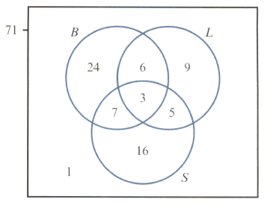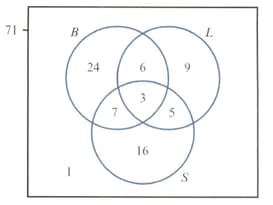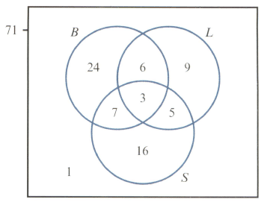Dean Chalmers and Julian Gilbey Solutions for Chapter: Probability, Exercise 10: END-OF-CHAPTER REVIEW EXERCISE 4
Dean Chalmers Mathematics Solutions for Exercise - Dean Chalmers and Julian Gilbey Solutions for Chapter: Probability, Exercise 10: END-OF-CHAPTER REVIEW EXERCISE 4
Attempt the practice questions on Chapter 4: Probability, Exercise 10: END-OF-CHAPTER REVIEW EXERCISE 4 with hints and solutions to strengthen your understanding. Cambridge International AS & A Level Mathematics : Probability & Statistics 1 Course Book solutions are prepared by Experienced Embibe Experts.
Questions from Dean Chalmers and Julian Gilbey Solutions for Chapter: Probability, Exercise 10: END-OF-CHAPTER REVIEW EXERCISE 4 with Hints & Solutions
Bookings made at a hotel include a room plus any meal combination of breakfast , lunch and supper . The Venn diagram opposite shows the number of each type of booking made by guests on Friday.

A guest who has not booked all three meals is selected at random. Find the probability that this guest:
has booked breakfast or supper
Bookings made at a hotel include a room plus any meal combination of breakfast , lunch and supper . The Venn diagram opposite shows the number of each type of booking made by guests on Friday.

A guest who has not booked all three meals is selected at random. Find the probability that this guest:
has not booked supper, given that they have booked lunch.
Bookings made at a hotel include a room plus any meal combination of breakfast , lunch and supper . The Venn diagram opposite shows the number of each type of booking made by guests on Friday.

Find the probability that two randomly selected guests have both booked lunch, given that they have both booked at least two meals.
Three strangers meet on a train. Assuming that a person is equally likely to be born in any of the months of the year, find the probability that at least two of these three people were born in the same month of the year.
A box contains three black and four white chess pieces. Find the probability that a random selection of five chess pieces, taken one at a time without replacement, contains exactly two black pieces which are selected one immediately after the other.
The following table shows the numbers of IGCSE and Level examinations passed by a group of university students.
| IGCSEs | |||||||
| A Levels | |||||||
For a student selected at random, find:
The following table shows the numbers of IGCSE and Level examinations passed by a group of university students.
| IGCSEs | |||||||
| A Levels | |||||||
For a student selected at random, find:
The following table shows the numbers of IGCSE and Level examinations passed by a group of university students.
| IGCSEs | |||||||
| A Levels | |||||||
Six students who all have at least three A Level passes are selected at random. Find the greatest possible range of the total number of IGCSE passes that they could have.
